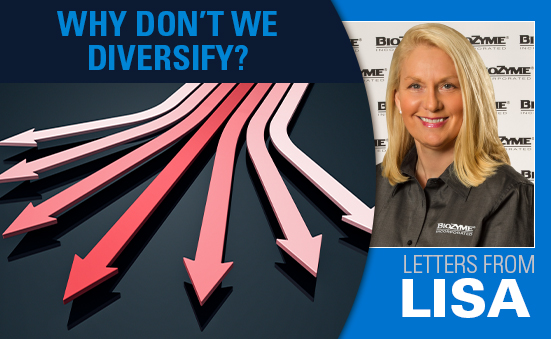Don’t put all your eggs is one basket is a proverb that dates back at least to the 1600s. There are several stories concerning the origin of the expression, but it may have been inspired by the real-life experiences of poultry farmers who used wagons and baskets to take their eggs to market. If all of a farmer’s eggs were placed in one basket, it would only take one unfortunate accident along the way to ruin his entire investment and opportunity.
By not putting all your eggs in one basket, you reduce the risk of having nothing to offer at the market by pinning all your hopes or future goals on one and only one option. In business, we refer to this as diversification.
Diversification
Diversification is a foundational principle of a sound, long-term plan. One of the key benefits of diversification is that it makes for a smoother ride on the path to achieving one’s goals. In short, we are vulnerable if we rely too heavily on one species, one major customer or one region. Diversification is about developing new products, exploring new markets and taking new risks. None of this diversification lingo is not new information. So why don’t we diversify?
We Intentionally Say No
I’m as surprised as anybody, but Crocs’ all-purpose footwear is still going strong long after their 2002 debut. They’ve come a long way since then; their initial batch of 200 pairs sold out immediately, but they now weigh in as a $880 million company, just in the U.S. And still they remain singularly focused on their flagship product. Michelin is another company that notably stuck to its guns – or, in this case, tires. Although they’ve dabbled in manufacturing things like road maps and rocket components, Michelin keeps coming back to the product that made them famous: tires. They were the first radial tire company to span the globe, and today they’re one of the most recognizable names in the automotive industry.
We Don’t Like Risk
Keep in mind that the path toward diversification will be decided, at least in part, by how much of a risk we want to take – and how much money we have available to take it. If one is risk averse, they tend to not diversify, which in the end is sometimes very risky.
We Don’t Have the Right Expertise
When you do one thing, you can train your staff and use their expertise to execute, unlike when you offer dozens or hundreds of products that require additional expertise not currently possessed by your staff.
We Don’t Have the Right Mindset
Diversification must be a purposeful mindset to influence the future of the company. For many, this mindset is just not an option. Having the openness to hear new ideas, and the flexibility to act on tactical diversification opportunities that can ultimately serve you better than sticking strictly to your original strategy takes an open, visionary mindset. Note that only 3.2% of Americans are visionary so this is difficult.
Diversification can mean something different to every single business. It takes effort and its own kind of focus, so it’s important to first assess whether it’s something your company is striving for, and if so, then examining and perhaps also trying different avenues that may suit your business and your company mindset.
But remember, for diversification to be an option in the first place, openness and willingness to change is the most important criteria.

